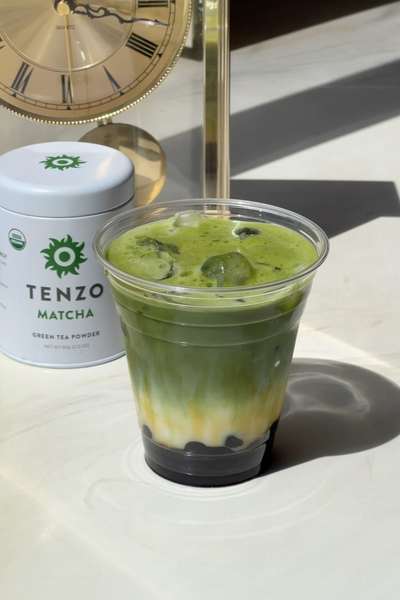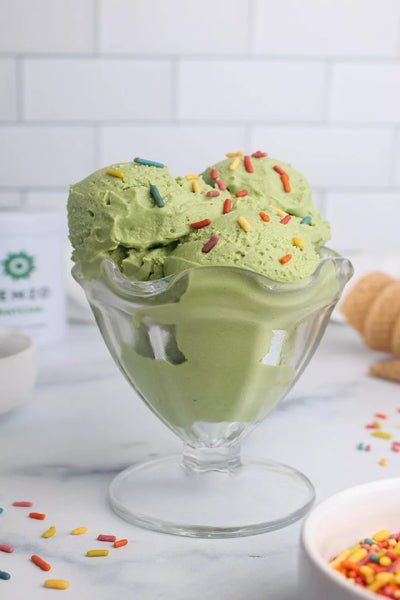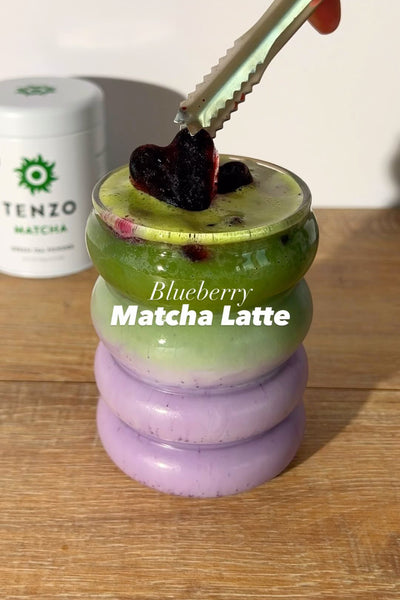Milk Matcha For All It’s Worth

What Milk Should You Be Drinking With Your Matcha?
Just as everyone has a different favorite matcha drink, they also have a favorite milk to drink matcha with. Our super simple and delicious matcha iced latte calls for almond milk, but as we mentioned in the recipe, can be substituted for any type of milk you wish. So how do you know what milk makes your matcha-loving heart swoon? Simply by preference. One of the things that we love about matcha is its versatility. It can be used in everything from baked goods to smoothies, and it’s subtle yet earthy taste pairs well with many different flavors. And, because of this, matcha tastes great with pretty much any milk.
Although we consider ourselves matcha experts, we simply cannot pick a favorite milk. They all have something special to offer, and each and every one tastes great with matcha. So, instead, we’ve rounded up a selection of our favorite varieties of milk and highlighted some of their pros and cons, so that you can make your own choice. If you still can’t decide after reading, just slowly work your way down the list. You’re bound to discover a matcha milk that you love.
Nut Milks

Almond Milk
Picking your favorite nut milk is a tough nut to crack, but if we had to pick, almond milk would certainly be in the mix. It's great if you’re looking for a traditional milk flavor and texture but with fewer calories. The slightly sweet but universally pleasing taste of almond milk, makes it a favorite for many people, especially matcha drinkers. And, this is the reason that you’ll find almond milk as the suggested milk in many of our own recipes. You can even make almond milk at home, with nothing but almonds and water.
The only downside here is nutritional density. Although almonds are touted for a high protein and healthy fat content, that doesn’t carry over to the milk and can therefore leave some people wanting. But, if you’re looking to start your matcha milk journey off with a beloved classic, there could be no better beginning than almond milk.
Soy Milk
Another beloved milk alternative is soy milk. Although it is likely the most popular alternative to traditional milk, soy milk lacks the sweetness that many people crave with matcha. You can buy sweetened versions, but keep in mind that they have added sugars. However, what it lacks in sweetness, it makes up for with nutrients. On average, soy milk has four grams of fat, seven grams of protein, and three grams of carbohydrates, making it similar in protein and fat content to a glass of 2 percent milk.
In addition to this, it is also the cheapest option for plant-based milks and far-and-away the easiest to find in store. The only downside to soy milk is that it curdles when heated. So if you plan on using soy milk in your matcha lattes, we suggest that you make it iced.
Cashew Milk
Similarly to almond milk, unsweetened cashew milk is a great low-calorie choice but it is low on nutrients. This makes cashew milk a great option if you’re trying to reduce your calorie intake. But, if you’re an athlete or in a gaining phase, this milk wouldn't be the best option. Where cashew milk really shines is its creaminess. This makes it a favorite vegan swap for recipes like vegan mac n’ cheese and alfredo sauce, but it also makes it perfect for concocting a rich and delicious matcha latte. And, just as with almond milk, you can make this dairy alternative at home.
Plant Milks
Coconut Milk
Coconut milk packs the most flavor of all types of dairy milk alternatives. With a rich, creamy taste that lends itself well to most beverages, coconut milk is slowly becoming a national favorite. It has a high fat content that heats well and its natural sweetness means that you can usually skip the Splenda. We love using coconut milk in baked goods and smoothies, where it’s thick texture is especially appreciated, but the slightly tropical taste this milk adds to drinks can’t be beat.
Rice Milk
If you’re an athlete or someone looking to fuel their body with high-quality fats and nutrients, unsweetened rice milk is a great alternative to classic dairy. With 11 grams of carbs per one-cup serving, the carb-heavy base makes it ideal for a pre workout matcha mix. It tends to be slightly more expensive compared to other milk alternatives, like soy and almond milk, but this price tag comes with plenty of other benefits.
Hemp Milk
This trendy milk alternative has more fat and protein than almond or rice milk, with 4.7 grams of protein and 7.3 grams of fat. And, unlike many of the other plant-based options we’ve mentioned, it contains a complete group of proteins with the full range of amino acids. This makes it a great partner for rice milk, but instead of using it as a pre-workout matcha, we suggest using it as a post-workout recovery smoothie. It lacks the natural sweetness of some of the other options, so it may not be the best “beginner milk.” However, the biggest downside of hemp milk is that it can be hard to find and pricier than other alternatives. But, if you can get your hands on it, you’ll be rewarded with a nutrient-dense beverage.
Oat Milk
Last, but certainly not least, oat milk. Oat milk has grown in popularity in recent years, so much so that it is now a popular option at coffee shops around the world. It has a deliciously creamy texture without feeling too heavy. It can be heated without curdling and made at home in order to save money. If you’re looking for a milk that will work with just about anything, oat milk is a great choice. It’s typically pricier than options like soy or almond milk, but can be found pretty much anywhere. Oat milk makes a perfect partner for any matcha drink.

What Milk is Man of the Matcha?
Hopefully what you’ve learned here is that there are tons of alternatives to just regular ole milk. And, many of these alternatives have tasty benefits. Whether it be extra sweetness or a high-fat content, each milk offers something unique. It’s for this reason, that we declare a universal tie in the battle of matcha milks. Everyone is looking for something different from their daily matcha recipe, so everyone will have different preferences. The key is finding your favorite type of milk.
Finding the best milk for your matcha is as simple as trying all these types of milk and discovering what you think tastes best. But in reality, any milk is a great way to introduce matcha to a friend. Like coffee and liquor, matcha is often an acquired taste, and mixing it with water and serving it up in a shot isn’t typically the best way to open someone’s eyes up to the magic of matcha. For this, we suggest pairing your matcha with coconut or almond milk. Both milks play well with the subtle, natural sweetness of matcha without completely overtaking the flavor. But, when you have the dynamic duo of matcha and milk, you really can’t go wrong.










